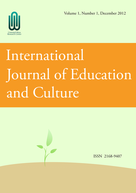


Volume 13 Issues 3-4 (2024-12-31)
Volume 13 Issues 1-2 (2024-06-30)
Volume 12 Issues 3-4 (2023-12-31)
Volume 12 Issues 1-2 (2023-06-30)
Volume 10 Issues 1&2 (2021-06-30)
Volume 9 Issues 3&4 (2020-12-31)
Volume 9 Issues 1&2 (2020-06-30)
Volume 8 Issues 3&4 (2019-12-31)
Volume 8 Issues 1&2 (2019-06-30)
Volume 7 Issues 3&4 (2018-12-31)
Volume 7 Issues 1&2 (2018-06-30)
Volume 6 Issues 3&4 (2017-12-31)
Volume 6 Issues 1&2 (2017-06-30)
Volume 5 Issues 3&4 (2016-12-31)
Volume 5 Issues 1&2 (2016-06-30)
Volume 4 Issues 3&4 (2015-12-31)
Concerted efforts have been made by a small private Western New York university to improve the quality of science education among students taking Advanced Placement Biology in local high schools through the “Lessons in Molecular Biology” (LIMB) program. College students were given the opportunity to take on leadership and mentoring roles, as they brought valuable biotechnology knowledge and skills into the high school setting through participation in this program. As such, LIMB provides an excellent example of the incorporation of service-learning in the undergraduate curriculum for science and education majors. The philosophy behind the LIMB program should be applicable in many other courses, and as such may be viewed as a model for college-high school collaborative efforts.
This qualitative study examined the understandings and practice of three elementary school teachers who were rated as effective classroom managers in a high poverty predominately African American school. Findings provided evidence that culture was an important factor in the teachers’ effective practice and that the care teachers showed as warm demanders provided the foundation for all other aspects of classroom interactions. Conclusions from this research are intended to augment teacher education programs’ understandings about what pre-service teachers need to know and be able to do in order to be successful in these challenging school contexts.
This paper uses conversational analysis (CA) as the analytical approach to analyze an audiotaped casual conversation among graduate students from Japan, Korea, Malaysia and Vietnam to illustrate how participants construct interculturality by displaying their expertise in talks about diverse cultural practices. The analysis also focuses on how these multicultural students launch topical talk in their casual lunch conversation and how they categorize their membership identity in and through talk in regard to their discourse identities, and social identities. The participants in the data presented in this article repeatedly produce a common set of questions that indicate the participants’ presupposition of the other participants’ categorizations. The findings of this study suggest that multicultural interactions about specific cultural practices do not necessarily lead to the enactment of cultural difference among participants. Instead, participants may try to find common ground so that they can diminish and discard cultural differences.